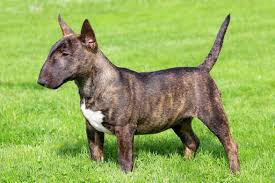
Miniature Bull Terrier
Conditions of detention
Miniature Bull Terriers are adaptable and can live comfortably in both apartments and houses with yards. They are energetic and need regular exercise but are also content spending time indoors with their family.
Useful Fact: Due to their compact size, Miniature Bull Terriers are well-suited for urban living, provided they receive enough exercise.
Nutrition and diet
A balanced diet of high-quality dog food suitable for their age, size, and activity level is essential for Miniature Bull Terriers. They can be prone to obesity, so portion control and regular feeding schedules are important.
Useful Fact: Monitor their weight and adjust their diet accordingly to prevent obesity-related health issues.
Health
Miniature Bull Terriers are generally healthy, but they can be prone to certain genetic conditions such as deafness, patellar luxation, and heart issues. Regular veterinary check-ups are crucial.
Useful Fact: Deafness is more common in white Miniature Bull Terriers, so it’s important to test their hearing early.
Grooming and care
Miniature Bull Terriers have a short, smooth coat that is easy to maintain. Regular brushing helps remove loose hair and keep their coat healthy. They are moderate shedders.
Useful Fact: Their short coat requires minimal grooming, making them low-maintenance in terms of coat care.
Education and training
Miniature Bull Terriers are intelligent but can be stubborn. Early socialization and consistent, positive reinforcement training are essential to manage their independent nature.
Useful Fact: These dogs respond well to fun, engaging training sessions that keep them mentally stimulated.
Toys and entertainment
Miniature Bull Terriers are playful and energetic, enjoying a variety of toys, including chew toys, fetch toys, and puzzle games. Regular playtime is important to keep them happy and healthy.
Useful Fact: Providing durable chew toys can help satisfy their strong chewing instinct and prevent destructive behavior.
Safety
Ensure your home and yard are secure, as Miniature Bull Terriers are curious and can be escape artists. Always use a leash when walking in unsecured areas to prevent them from wandering off.
Useful Fact: Their strong prey drive means they should be supervised around small animals and securely fenced in to prevent escapes.
Accessories
Basic accessories include a comfortable collar, leash, and identification tags. They also benefit from a sturdy harness, a cozy bed, and appropriate-sized crates if crate training.
Useful Fact: A harness can provide better control during walks and reduce strain on their neck.
Socialization
Early and ongoing socialization with people, other dogs, and various environments is important for Miniature Bull Terriers. This helps them grow into well-rounded and confident dogs.
Useful Fact: Puppy socialization classes can help expose your Miniature Bull Terrier to new experiences in a controlled environment.
Travel and Transportation
Miniature Bull Terriers are good travelers if accustomed to it from a young age. Use a secure crate or a seatbelt harness for car rides to ensure their safety.
Useful Fact: Regular breaks during long trips help keep your Miniature Bull Terrier comfortable and reduce travel stress.
Behavior and psychology
Miniature Bull Terriers are known for their playful, energetic, and sometimes stubborn nature. They form strong bonds with their families and thrive when given regular physical and mental stimulation.
Useful Fact: Understanding their need for companionship and activity can help prevent behavioral issues such as separation anxiety or destructive behavior.
Legal aspects
Ensure compliance with local pet ownership laws, including licensing and leash regulations. Keep their vaccinations and identification up to date.
Useful Fact: Some areas may have breed-specific regulations, so it’s important to stay informed about local laws regarding Bull Terrier breeds.


